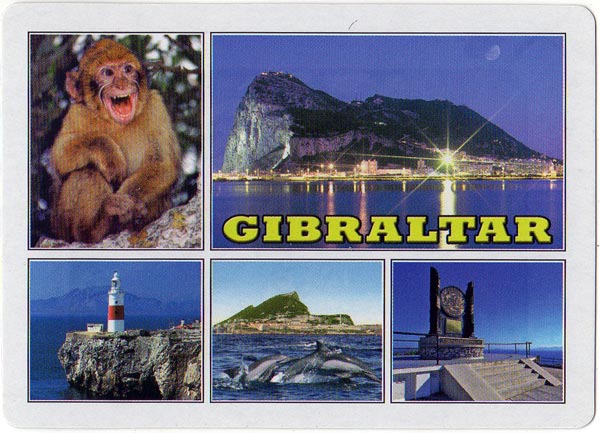Gibraltar
Playing Cards in Gibraltar.
Ever since the Anglo-Dutch fleet captured Gibraltar over 300 years ago during the war of Spanish succession, the small territory at the southern tip of Spain has been a bone of contention between Madrid and London. Although British sovereignty was formalised by the treaty of Utrecht in 1713 and Gibraltar became a British colony in 1830, Spain understandably has always bristled at the idea of UK ownership. Referendums - in 1967 and 2002 - have shown that the overwhelming majority of residents wish Gibraltar to remain British.
In the early WW2 playing cards were regarded as superfluous. However, in 1943 Mr Winston Churchill intervened to ensure that a supply was available for the forces to provide amusement during long hours of monotony or waiting.
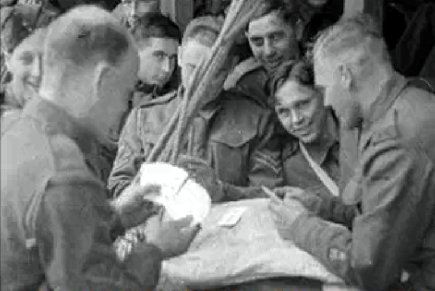
Above: image from video newsreel film showing 2nd World War troops being issued with playing cards whilst en route between Britain and Gibraltar.
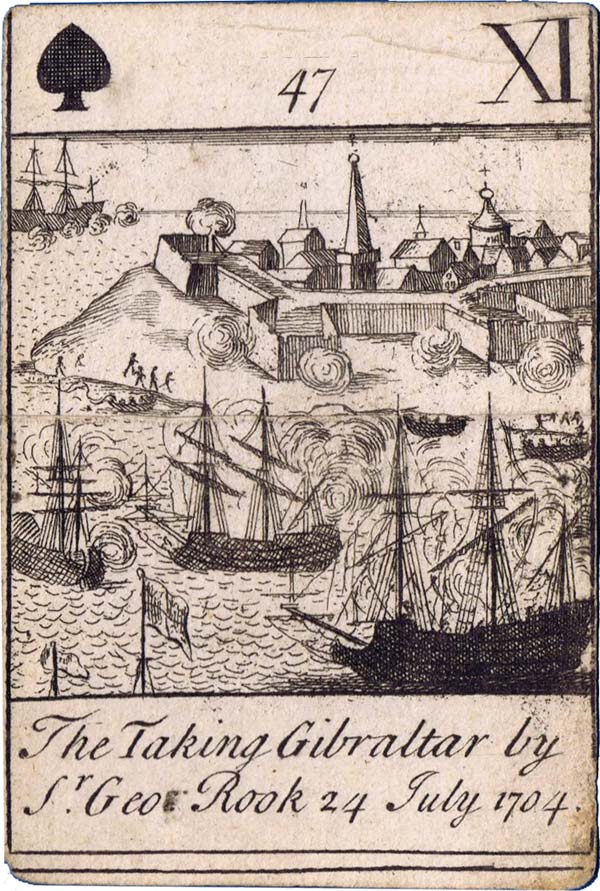
Above: card from the “Royal Cards of Queen Anne” covering historical events during the period 1702 to 1704. See more →
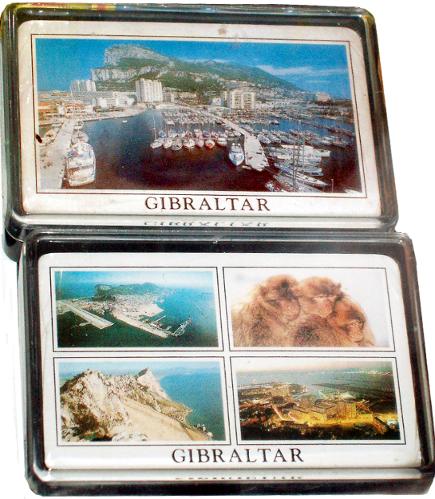
Above: two typical packs of “Gibraltar Souvenir Playing Cards”, as seen in local shops during a visit in 2011, with reverses showing the same photographic views as on picture post cards.
"One dull evening Major Burke, the town-major of Gibraltar, was sitting playing cards with two other officers in a house near King’s Bastion. In the middle of a deal a stray shell crashed into the room putting out the candle. It also unfortunately fell on his lap. In those early days shells did not necessarily explode on impact. The long fuses attached to them tended to burn for quite a while. His card-playing friends immediately leapt out of the room and were unharmed. Poor Burke, however, was pinned down by the weight of the shell and was blown to pieces."
Above & right: 52 Souvenir Photos of Gibraltar playing cards produced locally by ‘Estoril’, c.2012. 52 different photos, plus 2 comic jokers. Courtesy Matt Probert.
Gibraltar's geographical location made it into a key strategic asset. A unique feature of the Rock is its system of underground passages, known as the Galleries or the Great Siege Tunnels. Now that its military importance has declined, and with no large-scale agricultural or industrial activity, much of Gibraltar's income is derived from customs duties, offshore finance, internet gaming, tourism and the provisioning of ships. The Ocean Village Development, for example, one of the newest premier investment opportunities in Gibraltar, hopes to cater for the millions of tourists who visit each year. At the same time, 800 affordable flats have been built recently for local residents, many of whom are experiencing debt problems or unemployment. The many souvenir shops today offer standard Anglo-American packs bearing photographic scenes on the reverse, made cheaply in China or other Far Eastern countries, as no playing card manufacturer is based in Gibraltar.

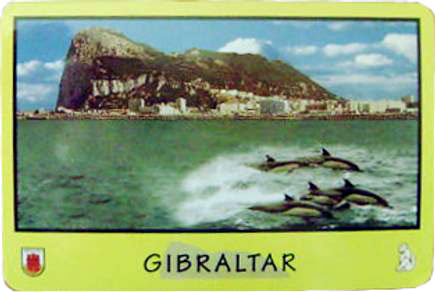
Read article about the Online Gambling industry in Gibraltar►
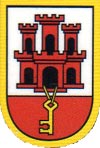
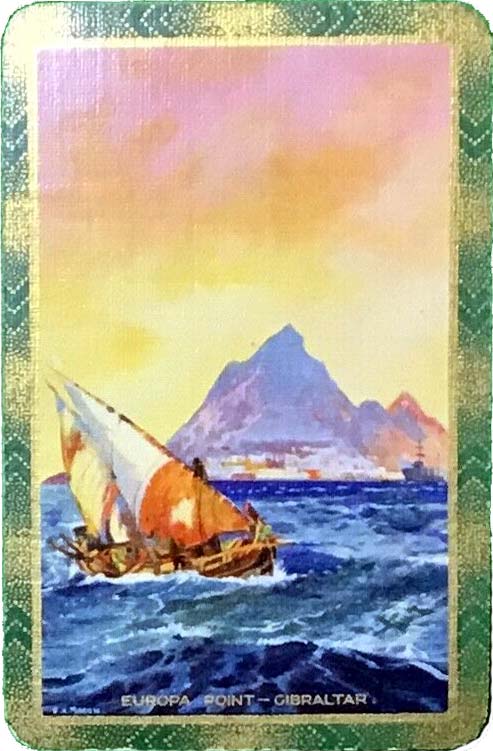

By Simon Wintle
Member since February 01, 1996
Founder and editor of the World of Playing Cards since 1996. He is a former committee member of the IPCS and was graphics editor of The Playing-Card journal for many years. He has lived at various times in Chile, England and Wales and is currently living in Extremadura, Spain. Simon's first limited edition pack of playing cards was a replica of a seventeenth century traditional English pack, which he produced from woodblocks and stencils.
Related Articles

Songs with Flute accompaniment
Eighteenth century English engraved cards with music for voice and flute.

Love Tests
Vintage novelty “Love Test” cards of a slightly saucy nature but all in good fun!

Ben 10 playing cards
Characters from the American animated television science fantasy series Ben 10.

Doctor Who Trump Card Game
Game for two players in which Doctor Who and the Legendary Legion join battle with the Alien Hordes....

Disney’s Aladdin playing cards
Characters from the 1992 Disney film Aladdin.

2011 Worshipful Company Pack
Celebrating the bicentenary of the birth of Charles Dickens, with characters adapted from drawings b...

Jockey Club de Buenos Aires
Spanish-suited pack by Chas Goodall & Son Ltd for the Jockey Club, Buenos Aires.

New interest in old games
Games once fashionable are now eclipsed by quicker gratifications.

Polygo™
Cards of irregular, four-sided shape for playing word and colour games as well as more traditional o...

Treasures from the Bodleian Library
Rare books, manuscripts, music scores, portraits, maps, gospels, chronicles and other valuable artef...

Victorian grocer’s scale plate
Large flat plate decorated with highly coloured English cards and royal arms.

Queen of Arts
A wide variety of women artists celebrated on cards with illustrations by Laura Callaghan.

The Glasgow Pack
Issued to celebrate Glasgow’s reign as European City of Culture in 1990, with city views and works o...

Cathedrals, Abbeys & Minsters playing cards
54 pictures of different famous cathedrals, abbeys and minsters in England and Wales.

Christmas Carols
Christmas Carols playing cards illustrated by Stuart Dilks

Pam is the Knave of Clubs
Playing cards as metaphors in 18th century art - from fate, chance and social hierarchy t...
Most Popular
Our top articles from the past 28 days











